BLOG: Reflections on my Kendall Fellowship: I Couldn’t Have Asked for More
I feel incredibly lucky to have spent the past year at the Constitutional Accountability Center (CAC). As one of my colleagues once put it, CAC does what so many of us go to law school hoping to do one day and I feel very grateful to have had this experience so early on in my legal career. I’m going to miss it so much.
In the last year, I’ve written or co-written over a dozen briefs explaining that the text and history of the Constitution and many statutes support progressive outcomes on a wide range of questions. I’ve written on behalf of CAC, leading scholars, and former government officials and filed briefs in the Supreme Court and in courts of appeals across the country in support of the work of some of the leading progressive organizations in the United States. Throughout, I’ve been privileged to work on many issues that I care deeply about, from fighting unconstitutional forced labor practices, to dismantling barriers to police accountability, to advancing LGBTQ+ equality. One thing I especially love about our work is that CAC is involved in both the big issues of the day and the less well-publicized but enormously important legal issues faced by the most marginalized in our society. And from basically day one, I’ve been working on both—from cases related to oversight of the January 6th attack to a case about a seemingly technical aspect of the Prison Litigation Reform Act that can determine whether indigent prisoners get relief for horrific abuses they suffer behind bars.
But of course, the best part of the fellowship has been the chance to work with the fantastic team at CAC. It’s hard to describe how much I’ve learned from everyone here—about just how progressive our Constitution is, the wide array of issues that CAC is expert in, how to be an effective advocate, and how to think critically and creatively about the law. They have made CAC not just a powerhouse in the courts, but a fantastic place to work. And as an organization that primarily does amicus work, I’ve gotten to work with amazing organizations and lawyers across the country doing essential work on all types of issues.
There’s no sugar-coating that my fellowship year took place during a rough time for our constitutional democracy, to put it mildly. The Supreme Court overturned Roe v. Wade, taking away the constitutional right to abortion and casting doubt on a whole host of other fundamental rights that millions of us rely on every day. At the same time, the Court severely limited our ability to protect ourselves from some of the most pressing threats we face as a nation (gun violence) and as a species (climate change), to name just a few of the devastating blows the Court dealt in June 2022. We’ve also learned a great deal about the former president’s efforts to violently overturn the results of the 2020 election and that the threat he and others like him pose to democratic self-government remains very much alive.
There are many reasons to despair, and you might think that a fellowship spent litigating progressive causes before our largely conservative judiciary would only bring into sharp relief the tremendous challenges we face. But working at CAC during this trying year has been a vital source of hope. How could I not feel hopeful after getting to work with brilliant, dedicated attorneys who remain firm in their convictions that truth and justice will ultimately prevail? After having the chance to support the pioneering work of countless other organizations advancing progressive causes even with the deck increasingly stacked against them?
Because of the year I got to spend with this incredible team, I enter the next chapter of my legal career not only with the benefit of an unparalleled professional experience, but also with a strengthened commitment to fighting for progressive change through the law. I couldn’t have asked for more.

